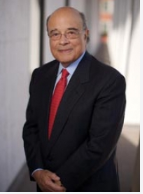
In Memoriam
Adel Mahmoud, MD, PhD, FIDSA, a pioneer in the treatment and prevention of infectious diseases around the world, died on June 11 at the age of 76. He was one of the most prominent and widely respected voices in global health. Dr. Mahmoud was the 1984 recipient of IDSA’s Oswald Avery Award.
During a storied medical career, Dr. Mahmoud was an influential leader in academia, biopharmaceutical research and development, and global health policy. His chief contributions to science and public health involve the study of neglected tropical diseases, especially parasitic infections.
“Adel was a kind and giving mentor and friend who always had time to talk to you about career, about life and anything you had in mind. His book Tropical and Geographic Medicine is considered the bible on this topic,” said Carlos Del Rio, MD, FIDSA, Hubert Professor and Chair, Hubert Department of Global Health and Professor of Medicine at Emory University, IDSA Global Health Committee member.
Born in Cairo, Egypt in 1941, Dr. Mahmoud’s first brush with infectious diseases came at the age of 10 when he sprinted to a local pharmacy to procure penicillin for his father, who was dying of pneumococcal pneumonia. He didn’t make it back in time.
Dr. Mahmoud received his medical degree from the University of Cairo in 1963. As a medical student, he became active in politics, serving as a leader in former Egyptian President Gamal Abdel Nasser’s youth movement. But as the political climate in Egypt evolved, Dr. Mahmoud recommitted himself to medicine and left Egypt in 1968 for the United Kingdom. In 1971, he obtained a doctorate from the London School of Hygiene and Tropical Medicine.
His early research focused on the role of eosinophils, a type of white blood cell, in the body’s defense against parasitic worms. Dr. Mahmoud immigrated to the U.S. in 1973 as a post-doctoral fellow at Case Western Reserve University. He subsequently rose through the ranks to lead the Division of Geographic Medicine and ultimately to chair the Department of Medicine from 1987 to 1998.
Beloved for his sharp intellect and dynamic personality, Dr. Mahmoud had an impact on thousands of medical students, physicians, and scientists, including many of today’s leaders in medicine and research. “Not only was he my lifelong mentor, he was a true force of health for people everywhere,” said Merck Executive Vice President and former CDC Director Julie Gerberding, MD, MPH, FIDSA.
In 1998, Dr. Mahmoud was recruited to serve as President of Merck Vaccines, a position he held until 2006. During his tenure at Merck, Dr. Mahmoud played a pivotal role in the development and commercialization of new vaccines to help prevent severe gastroenteritis, human papillomavirus (HPV), and shingles, as well as the quadrivalent formulation of measles-mumps-rubella-varicella vaccine. As of 2017, more than 500 million doses of these four vaccines have been distributed globally, according to the company.
Dr. Mahmoud frequently provided scientific advice to the World Health Organization, the National Institutes of Health, the Centers for Disease Control, the National Academies, the Rockefeller Foundation, and universities and research institutions around the world. He served as President of the International Society of Infectious Diseases from 1990-1992 and on boards of directors at GAVI, the International AIDS Vaccine Initiative, International Vaccine Institute, and several companies in the private sector. “Adel was always one of the very first people to whom we turned when we needed sage advice about difficult policy issues. His judgment was flawless,” said Anthony S. Fauci, MD, FIDSA, Director of the National Institute of Allergy and Infectious Diseases.
After retiring from Merck in 2006, Dr. Mahmoud returned to his academic roots. As a professor at the Woodrow Wilson School of Public and International Affairs and the Department of Molecular Biology at Princeton University, he engaged in public policy discussions and worked to imbue the next generation with the love of learning and commitment to public health that guided his life and career.
In the wake of the Ebola outbreak in West Africa in 2014, Dr. Mahmoud began advocating for the creation of a global vaccine-development fund. “We cannot let financial burdens stand in the way of solving deadly global health crises,” he said.
Dr. Mahmoud is survived by his wife of 25 years, Sally Hodder, MD, FIDSA, Associate Vice President for Clinical and Translational Science at West Virginia University and former HIVMA board member, and a son, Jay Thornton, as well as his siblings, Dr. Olfat Abdelfattah and Dr. Mahmoud Abdelfattah. An afternoon funeral is planned for Saturday, June 30 in Princeton. IDSA extends its heartfelt sympathies to Dr. Hodder and family.

